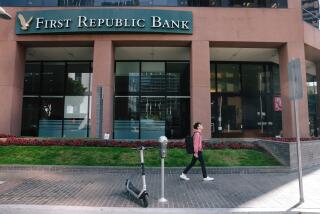Security Pacific Adds $350 Million to Loan Reserves
- Share via
Security Pacific said Monday that it has set aside an additional $350 million to cover potential losses on loans to less developed countries, a conservative step that analysts said reflected the banking company’s overall financial strength.
The action by Security Pacific of Los Angeles, the nation’s seventh-largest bank holding company, is expected to put pressure on other big banks to increase provisions for potential losses on loans to developing countries, according to analysts.
Banks with large loan-loss reserves have a potential competitive advantage over banks with smaller reserves. Management can use the reserve position to emphasize strength in competing for business and deposits. Well-reserved banks also tend to be more attractive to investors, resulting in higher share prices.
Security Pacific said it increased its loan-loss reserves to 54% of its exposure in less developed countries, principally Mexico and Brazil, and still showed a $15-million profit for 1987. Most big banks are expected to show losses in 1987 despite having average loan-loss reserves of only 25%.
“Maintaining profitability during 1987 while raising its percentage of reserves to the highest level among the major banks certainly differentiates Security Pacific from the other big banks,” said Paul H. Baastad, an analyst in the San Francisco office of S. G. Warburg, an investment firm.
George M. Salem, chief bank analyst at the New York firm of Prudential-Bache Securities, said: “This is a more realistic approach to what these loans are worth. It will be hard for most banks larger than Security Pacific to match this action. It is a real sign of strength.”
Strategy Few Can Afford
Security Pacific’s move was a step short of the dramatic action taken last month by Bank of Boston, which wrote off $200 million of its Third World debt and indicated that it will try to extricate itself completely from such loans.
The Bank of Boston action did not initiate a stampede among the nation’s big banks, chiefly because most of them could not afford such a strategy. Several other banks in the category known as “super-regionals,” however, took similar steps.
Richard J. Flamson III, chairman and chief executive of Security Pacific, said: “This action provides us with increased flexibility in view of the continued questionable environment surrounding the developing country debt issue.”
Richard A. Warner, an executive vice president, said the company is not abandoning Third World loans. But he said it will assess participation in new loans on a case-by-case basis.
Security Pacific said it would post a $40-million loss for the fourth quarter when full results are released next week. The resulting profit of only $15 million for 1987 ends 12 consecutive years of record-setting earnings at Security Pacific.
The company said it did not expect the action to affect the dividend on its common stock, currently $1.80 a share a year. A key monitor of overall financial health, the ratio of equity to assets, should be about 4.1%, a fairly robust figure, the company’s chief financial officer, John F. Kooken, said.
Security Pacific added $558 million to loan reserves in the second quarter of 1987, at the same time that most of the nation’s other large banks followed the lead of Citicorp with huge additions to loss reserves. Security Pacific set aside another $150 million in 1984.
The fourth-quarter addition brings total reserves for loans to developing countries to $980 million, about 54% of the bank holding company’s $1.8 billion in total non-trade portfolio of such loans. Mexico and Brazil account for $677 million and $618 million of the total, respectively.
Pressure to React
The bank did not label any additional loans as “non-performing,” which would have meant actually writing them off as losses.
Dan B. Williams, an analyst with the investment firm of Sutro & Co. in San Francisco, said it will be interesting to see whether the major New York banks react to Security Pacific’s move.
“I’m not suggesting that they will take the lead from Security Pacific any more than they did with Bank of Boston,” Williams said. “But Security Pacific is a world bank and . . . harder to ignore than Bank of Boston.”
Williams said the pressure to add to reserves may be strongest on Bank of America, which now has a reserve level of about 25% to cover a portfolio of troubled Third World loans. Bank of America’s weak financial position, however, makes the possibility of additional fourth-quarter reserves unlikely.
Williams said Wells Fargo, with a reserve equal to about 40% of its smaller loans, may respond with its own fourth-quarter addition for competitive reasons.
More to Read
Sign up for Essential California
The most important California stories and recommendations in your inbox every morning.
You may occasionally receive promotional content from the Los Angeles Times.













